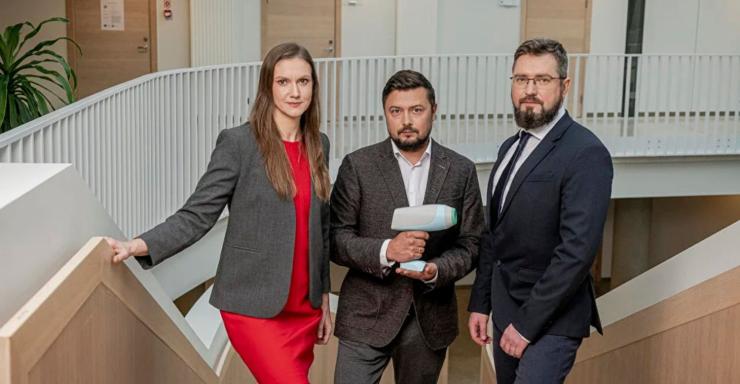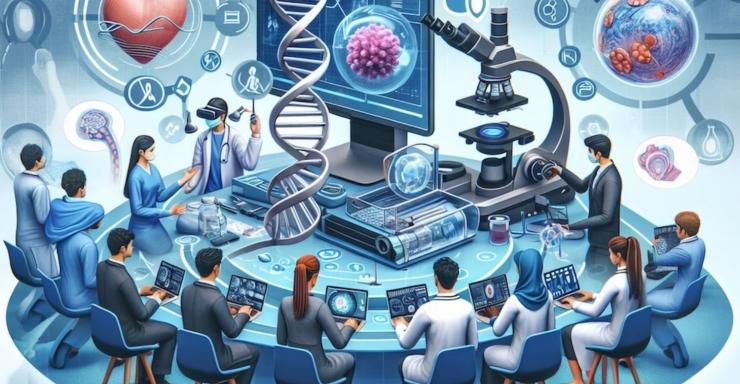The rapid progress of the 21st century compels companies to think not only about today but also about the products, technologies, and people of tomorrow. Alongside digitalisation and automation, the ability to combine knowledge, experience, and creativity is becoming ever more crucial. Therefore, the synergy between industry and research is not just a buzzword – it is a necessity if we want Latvia to become a knowledge-based economy rather than merely a supplier of cheap resources.

From Collaboration to Innovation
The wood industry has always been one of the cornerstones of Latvia’s manufacturing sector, yet global markets and climate challenges demand new approaches. To remain competitive, companies must be able to create products with high added value – something achievable only through close cooperation with science.
AS Latvijas Finieris has been investing in research and innovation for many years, working closely with the Latvia University of Life Sciences and Technologies, Riga Technical University, the University of Latvia, Vidzeme University of Applied Sciences, the Forest and Wood Products Research and Development Institute, the Latvian State Institute of Wood Chemistry, and the Latvian State Forest Research Institute Silava. This cooperation provides a broad scope – from sustainable forestry and resource studies to the development of new materials and technologies.
Such partnerships bring tangible benefits to both business and society. Production processes become more efficient, sustainable technologies are developed, and universities prepare future specialists who can tackle real industry challenges even during their studies. It is a mutually beneficial model that helps maintain Latvia’s competitiveness and the relevance of its science.
Industrial Doctoral Studies – A Bridge Between Science and Business
One of the clearest examples of how such collaboration transforms into real innovation is industrial doctoral studies – a relatively new but highly significant model in Latvia’s higher education system. Unlike traditional academic approaches, industrial doctorates are developed jointly with companies, and their results have direct practical application.
Currently, Latvijas Finieris, in cooperation with Riga Technical University, is implementing a project in which the company co-finances doctoral student Rinalds Bušs’ research on the use of birch bark extract – betulin – in materials science. Latvia’s birch forests are a natural treasure, yet the potential of betulin has so far been underutilised. Together with company researchers, the doctoral student is working on synthesising new compounds that enable the creation of polymer coatings with enhanced mechanical and thermal properties.
The research results have already gained international recognition – in early 2025, an article was published in the journal Reactive and Functional Polymers. This demonstrates that research originating in Latvia can also make a meaningful contribution to the global innovation landscape. We see that this cooperation is not just about a single scientific discovery – it is an investment in the future, where young researchers become a bridge between the academic and industrial worlds.
People at the Heart of Cooperation
It is important to remember that innovation does not emerge only in laboratories – it comes from people who are willing to collaborate, share experience, and cross boundaries between disciplines. Industrial doctoral programmes help foster exactly this mindset – encouraging young researchers to think broadly and companies to remain open to experimentation.
The example of Rinalds Bušs shows how valuable it is when a young scientist can base their work on real business needs. He has access to Latvijas Finieris infrastructure, raw materials, and expertise, while we gain new ideas that can evolve into high-value products. As a result of such collaboration, everyone benefits – the company, the university, the students, and society as a whole.
The Knowledge Economy Begins with the Courage to Collaborate
In Latvia, we still often talk about innovation as something distant or complex, but in truth, innovation begins where open-mindedness meets the willingness to cooperate. Industrial doctoral programmes are one of the ways to make this collaboration structured, long-term, and results-oriented.
For this model to develop fully, both state support and business initiative are needed. The public sector must create an environment where research is seen as an investment, not an expense, while companies must recognise that investment in science pays off in the long run – through new products, export-ready solutions, and talented people on their teams.
Looking Ahead
In the coming years, Latvia’s competitiveness will depend on how successfully we can unite industry, education, and science into a single ecosystem. This is the path toward an economy built on knowledge, creativity, and a mindset of progress.
Latvijas Finieris will continue to play an active role in this journey, strengthening the bond between industry and academia, fostering new research, and supporting young scientists. Our experience shows that when business needs meet scientific curiosity, results emerge that benefit everyone – companies, researchers, and the country as a whole.
Another noteworthy collaboration is with the RTU Institute of Architecture and Design. In Latvia, wood is a traditional, culturally significant, and widely available building material that has shaped both landscapes and living environments while embodying the potential of sustainable architecture today. By jointly developing a professional master’s programme for architects, we will promote broader inclusion of wood in architectural education. We also invite other entrepreneurs to seek opportunities and points of contact with higher education institutions. We believe that the century of wood’s renaissance has begun.


